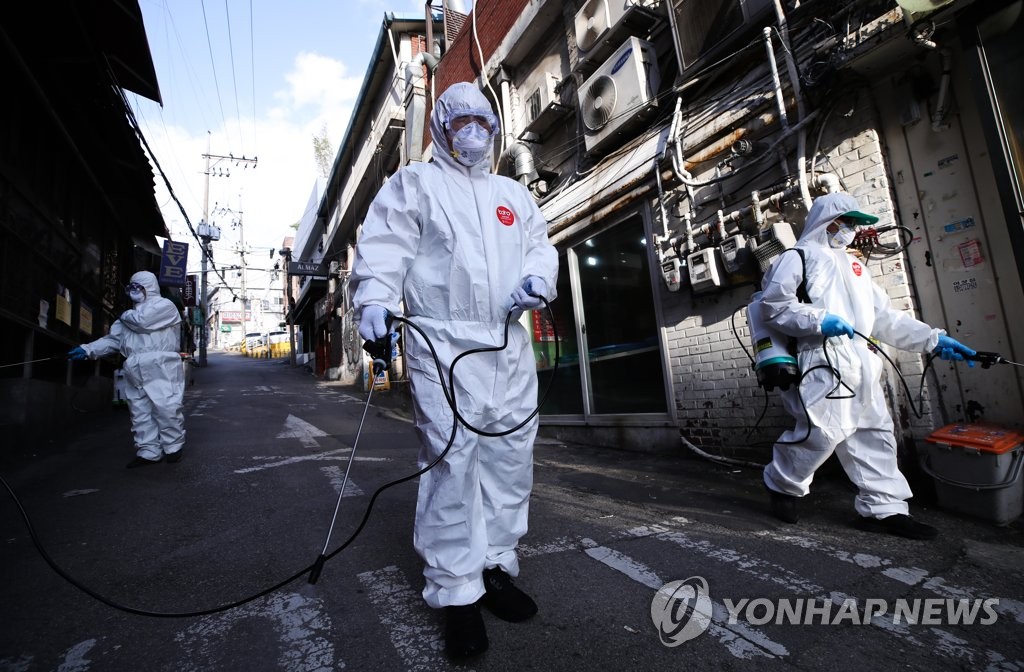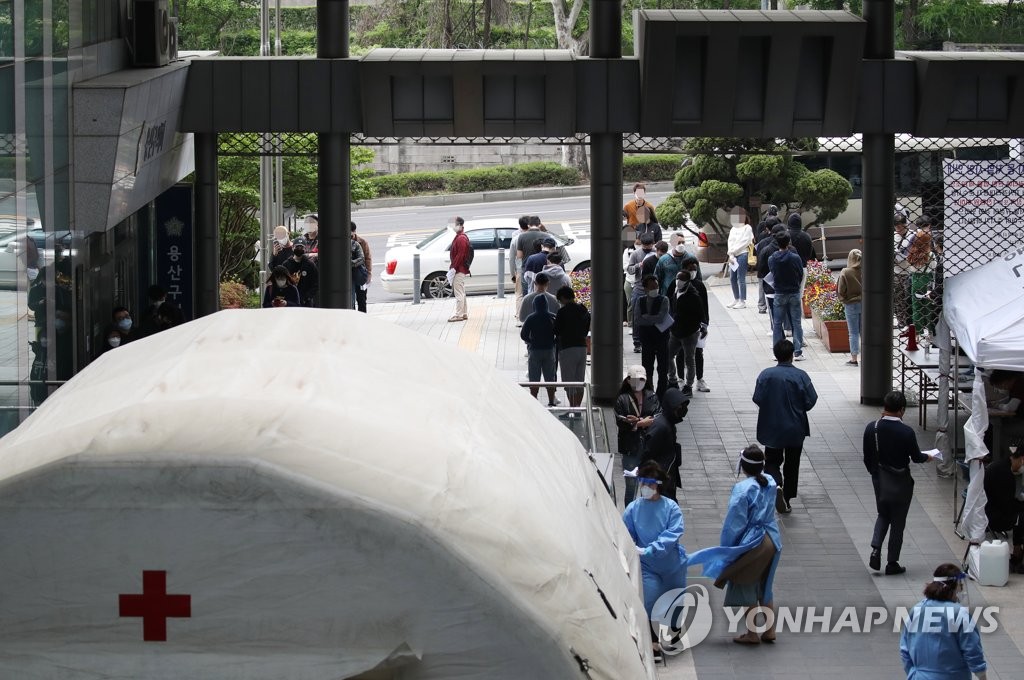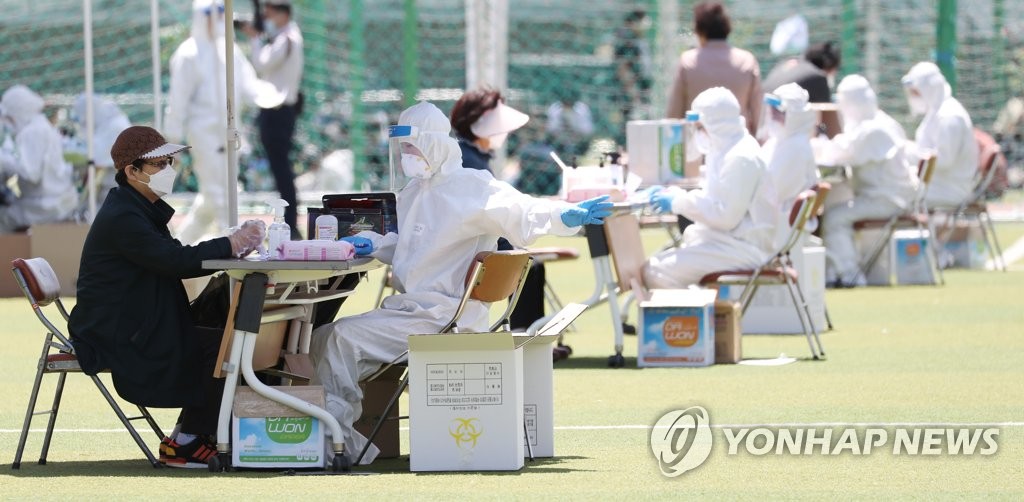- California Assembly OKs highest minimum wage in nation
- S. Korea unveils first graphic cigarette warnings
- US joins with South Korea, Japan in bid to deter North Korea
- LPGA golfer Chun In-gee finally back in action
- S. Korea won’t be top seed in final World Cup qualification round
- US men’s soccer misses 2nd straight Olympics
- US back on track in qualifying with 4-0 win over Guatemala
- High-intensity workout injuries spawn cottage industry
- CDC expands range of Zika mosquitoes into parts of Northeast
- Who knew? ‘The Walking Dead’ is helping families connect
Itaewon cluster caseload soars to 120, more secondary infections confirmed in Incheon, Busan
Cases linked to nightspots in the Seoul neighborhood of Itaewon hit 120 on Wednesday as secondary infections surfaced across the country, stoking concerns over the possibility of a bigger outbreak.
Infections in Seoul accounted for more than half of the cases at 70, with the number feared to rise after more visitors to the affected area are tested for the coronavirus. Some 20,000 have so far been tested, according to the health minister.
Authorities have been on the alert after a 29-year-old tested positive following visits to five clubs and bars — King Club, Trunk, Queen, Soho and H.I.M — in Itaewon, a popular nightlife district also known for its international community, in early May.
In less than a week, the case quickly swelled to a cluster infection, affecting not only those who had been to Itaewon but 43 who were infected through secondary transmission.



Volunteer workers disinfect a street in Itaewon located in the central Seoul ward of Yongsan on May 12, 2020. (Yonhap)
Patients were reported throughout the country, ranging from the wider capital area, including Gyeonggi Province and Incheon, to the southern port city of Busan and the resort island of Jeju.
While a majority of the patients were in their 20s and 30s, there were 11 who were under 19 and three who were 60 or older, including a 1-year-old in Busan who was reportedly infected by his uncle, as well as teenagers in Incheon who were infected by their cram school tutor. Both the uncle and the tutor visited Itaewon.
By gender, 102 were men and 17 were women.
The Incheon city government said a total of 11 cases related to the tutor have been confirmed. It plans to file a complaint against the instructor, who initially lied to health authorities by saying that he had no job.
While no tertiary transmission has yet been confirmed, the development has put health authorities on alert over “silent transmission” by patients showing no or mild symptoms.
The recent cases have also prompted the country to brace itself for another massive wave of infections following those related to the minor religious sect of Shincheonji in February.
Plans to reopen schools starting this week were postponed by a week after the Itaewon case emerged. Universities that were slowly resuming in-person classes have shifted back to remote learning.
The fact that infections were reported among people who visited other facilities in Itaewon or the university district of Hongdae in western Seoul has made the situation more challenging for health authorities.
Five of the six people who had visited a bar in the Hongdae area have tested positive for COVID-19, health authorities said.
Officials urged Itaewon visitors to come forward and get tested, assuring them that their privacy and personal details will be protected.
“(Containing) contagious diseases is a matter of speed. Voluntary screening is more important than anything. Please get checked immediately if you visited clubs in Itaewon between April 24 and May 6,” Seoul Mayor Park Won-soon said in a press briefing.
The city has also been attempting to track down possible patients through credit card transactions, closed-circuit TV footage and mobile access records after entry logs at some clubs turned out to carry false information.
Park said Wednesday that the city has secured a list of 10,905 people believed to have been in the area during the cited period based on data provided by mobile operators.
The city sent text messages urging them to self-isolate and get tested regardless of symptoms, including English-language texts sent to around 1,210 foreign nationals.
Officials at the city government and the ward office of Yongsan, meanwhile, said they plan to expand checks into visitors at four other Itaewon venues — Made, Pink Elephant, Pistil and the Fountain — where infections were reported.
The Yongsan ward office said it has wrapped up its initial probe into 5,517 people who had visited the five affected clubs, adding that it has reached 1,289 of the nearly 2,000 people who were unaccounted for.
A list of people who are still unavailable has been sent to the police for further probe, it said.
The city stressed that the club-related tests are conducted for free and that visitors who are concerned about reporting their personal details can receive anonymous testing.
As of Tuesday, a dozen municipal governments across the country, including Seoul and its surrounding Gyeonggi Province, have imposed or planned to impose an administrative order suspending business at nightlife facilities to prevent further transmission.











